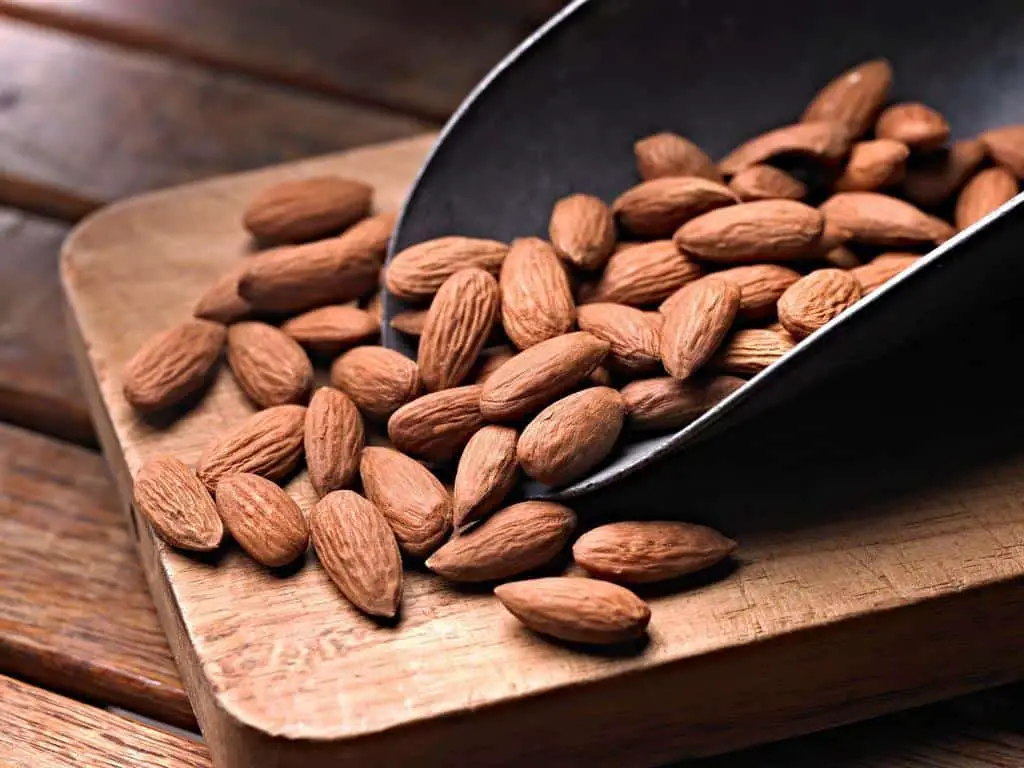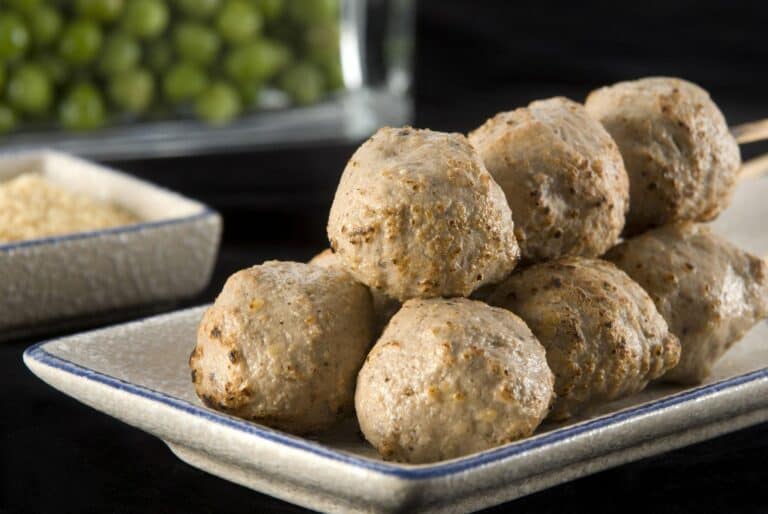Can You Eat Raw Almonds? Are Raw Almonds Safe To Eat?

Picture this: you’re snacking on a handful of almonds, enjoying the satisfying crunch and delicious flavor. But then a thought crosses your mind – can you actually eat raw almonds? Are they safe to consume?
Yes, you can eat raw almonds. While it’s safe to eat raw or roasted almonds, some people prefer to soak and peel them for added health benefits. Almonds are known for their nutritional benefits, being packed with protein, fiber, healthy fats, vitamins, and minerals.
In this article, we’ll delve into the question of whether or not raw almonds are safe to eat. We’ll explore the soaking and roasting process and how it affects the safety of raw almonds. In addition to that, we offer tips for selecting and preparing them.
By the end of this article, you’ll have all the information you need to confidently enjoy raw almonds as a healthy snack or ingredient in your favorite recipes. So, let’s get started!
Overview of Almonds and Its Nutritional Value
Raw almonds are the unroasted, natural form of the almond nut and are often considered a healthy snack due to their high nutritional value. Almonds are members of the Rosaceae family and are classified as tree nuts. They have a hard outer shell that must be removed to access the edible portion of the nut.
Raw almonds are a great source of healthy fats, protein, fiber, vitamins, and minerals. A one-ounce serving of raw almonds, which is approximately 23 whole almonds, contains about 6 grams of protein, 14 grams of fat, and 3.5 grams of fiber. Almonds also have a lot of vitamin E, magnesium, phosphorus, and potassium, all of which are important for keeping your body working well.
In addition to their nutritional value, raw almonds are versatile and can be eaten in a variety of ways. They can be eaten raw as a snack, added to salads or trail mixes, or used as a base for almond milk, almond butter, or almond flour.
WARNING
Take note that raw almonds may not be suitable for everyone. Some people may have an allergy or intolerance to almonds, which can cause symptoms such as hives, itching, and difficulty breathing. Before adding any new foods to your diet, you should always talk to a doctor or nurse, especially if you have a history of food allergies or intolerances.
Health Benefits of Raw Almonds
1. Lowering Cholesterol
Almonds are high in monounsaturated and polyunsaturated fats, also known as “good” fats, which have been shown to help lower cholesterol levels in the body. In addition to healthy fats, almonds are also rich in fiber and plant sterols, which have cholesterol-lowering properties.
Consuming raw almonds regularly as part of a healthy diet can help reduce the risk of heart disease and improve overall cardiovascular health.
2. Regulating Blood Sugar
Raw almonds have a low glycemic index, which means they cause a slower and steadier rise in blood sugar levels compared to high glycemic index foods like white bread or sugary snacks.
This makes them a great snack option for individuals with type 2 diabetes or those who want to maintain steady blood sugar levels throughout the day. Studies have shown that consuming almonds as a snack can help reduce post-meal spikes in blood sugar levels and improve insulin sensitivity.
3. Reducing the Risk of Heart Disease
Eating raw almonds may also help reduce the risk of heart disease. As mentioned earlier, the healthy fats and fiber found in almonds can help lower cholesterol levels in the body.
Additionally, almonds are a rich source of antioxidants, such as vitamin E, which have been shown to reduce oxidative stress and inflammation in the body. Both of these factors are known to contribute to the development of heart disease.
Incorporating raw almonds into a healthy diet can provide numerous health benefits. Almonds are healthy, but they shouldn’t be the only thing you do to take care of your health. For overall health and wellness, you need a well-balanced diet with a variety of nutrient-dense foods, regular physical activity, and ways to deal with stress.
Can You Eat Raw Almonds? Are Raw Almonds Safe To Eat?

Some people may wonder if it is safe to eat raw almonds or if they need to be cooked or roasted before consumption. As mentioned earlier, the answer is yes, you can eat raw almonds, but be aware of some potential risks and take precautions to minimize them.
Potential Risks of Eating Raw Almonds
One of the potential risks of consuming raw almonds is digestive problems. Almonds, like all nuts, contain phytic acid, which can bind to minerals in the digestive system and make them harder to absorb. This can lead to digestive discomfort, such as bloating, gas, and abdominal pain.
Soaking raw almonds in water overnight can help reduce the phytic acid content and make them easier to digest.
Another potential risk of consuming raw almonds is cyanide poisoning. Almonds contain a small amount of amygdalin, a substance that can break down into cyanide when consumed.
However, the amount of amygdalin in raw almonds is not usually enough to cause harm. To reduce the risk of cyanide poisoning, it is recommended to avoid consuming large amounts of raw almonds and to purchase them from a reputable source.
How to Select Raw Almonds for Eating
When it comes to selecting raw almonds for eating, there are a few important factors to consider to ensure that you are getting the best quality and taste. Here are some tips to help you choose the right raw almonds for your snacking pleasure.
Firstly, always look for raw almonds that are fresh and of high quality. When almonds are fresh, they have a sweet, nutty flavor and a crunchy texture. You can tell if almonds are fresh by looking at their color and texture. High-quality almonds should be light beige or cream-colored with a smooth surface and a firm, uniform texture. Avoid almonds that are discolored, have spots, or are soft and rubbery, as these may indicate that they are old or have been stored improperly.
Secondly, consider the source of the almonds. Raw almonds are typically imported from countries like Spain, Italy, and the United States. Make sure to choose almonds that are from a reputable source and have been stored and transported correctly. Almonds that have been exposed to moisture, heat, or direct sunlight can spoil quickly and lose their flavor and nutritional value.
Thirdly, decide whether you prefer shelled or unshelled almonds. Shelled almonds are more convenient for snacking and cooking, but they tend to be more expensive than unshelled almonds. Unshelled almonds, on the other hand, have a longer shelf life and can be stored for several months. However, they require more effort to crack open and may not be as convenient for snacking.
Finally, consider the packaging of the almonds. Almonds should be stored in a cool, dry place to maintain their freshness and quality. Look for almonds that are sold in airtight containers or resealable bags to prevent moisture and air from getting in.
Raw Almonds vs. Roasted Almonds: Which One Is Better?
Almonds are a popular snack that can be enjoyed in a variety of ways, but when it comes to choosing between raw almonds and roasted almonds, which one is better? The answer ultimately depends on your personal preference and dietary needs.
Raw almonds are simply almonds that have not been roasted or cooked in any way. They are the most natural form of almonds and make a great snack for people who want something with little processing. Raw almonds are also a good source of enzymes, which can aid in digestion and nutrient absorption.
On the other hand, roasted almonds are almonds that have been roasted in an oven or on a stovetop. Roasting almonds brings out their natural flavor and can give them a slightly crunchy texture. Roasted almonds are also a great source of healthy fats, as the roasting process helps release the oil from the nuts.
When it comes to nutritional value, both raw and roasted almonds have similar benefits. Both types of almonds are a good source of protein, healthy fats, fiber, and essential vitamins and minerals. However, raw almonds may have a slight edge in terms of nutrient content, as the roasting process can cause some loss of nutrients.
If you’re trying to decide between raw and roasted almonds, consider your personal dietary needs and preferences. If you’re looking for a minimally processed snack that is as natural as possible, raw almonds may be a better choice. On the other hand, if you’re looking for a snack that has a slightly different flavor and texture, roasted almonds may be a better option.
It’s also worth noting that in some circumstances, roasted almonds are bad for you. Roasted almond can sometimes be coated in salt or other flavorings, which can add extra sodium and calories to your diet. If you’re watching your salt intake or trying to maintain a low-calorie diet, be sure to check the label before reaching for a bag of roasted almonds.
Preparation of Raw Almonds for Safety Consumption
Raw almonds can offer many health benefits, but they can also be potentially harmful if not prepared correctly. Raw almonds can contain a compound called phytic acid, which can inhibit the absorption of certain nutrients in the body. Raw almonds can also have dangerous bacteria like salmonella, which can make you sick.
1. Soaking and Dehydrating Raw Almonds
One way to prepare raw almonds for safe consumption is to soak and dehydrate them. Soaking raw almonds in water can help remove the phytic acid, making them easier to digest and absorb nutrients. Soaking also helps to remove any harmful bacteria that may be present on the nuts. After soaking, the almonds are dehydrated at a low temperature to maintain their nutritional value and flavor.
2. Roasting Raw Almonds
Another way to prepare raw almonds is by roasting them. Roasting raw almonds can help remove the phytic acid and harmful bacteria, while also enhancing their flavor and texture. Roasting also adds a delicious nutty flavor to the almonds and can make them a great snack option.
However, it’s important to note that roasting can reduce some of the nutritional value of almonds, such as their vitamin E and antioxidant content. Roasting can also add unhealthy fats and excess sodium to the almonds, especially if they are roasted with oil or salt.






